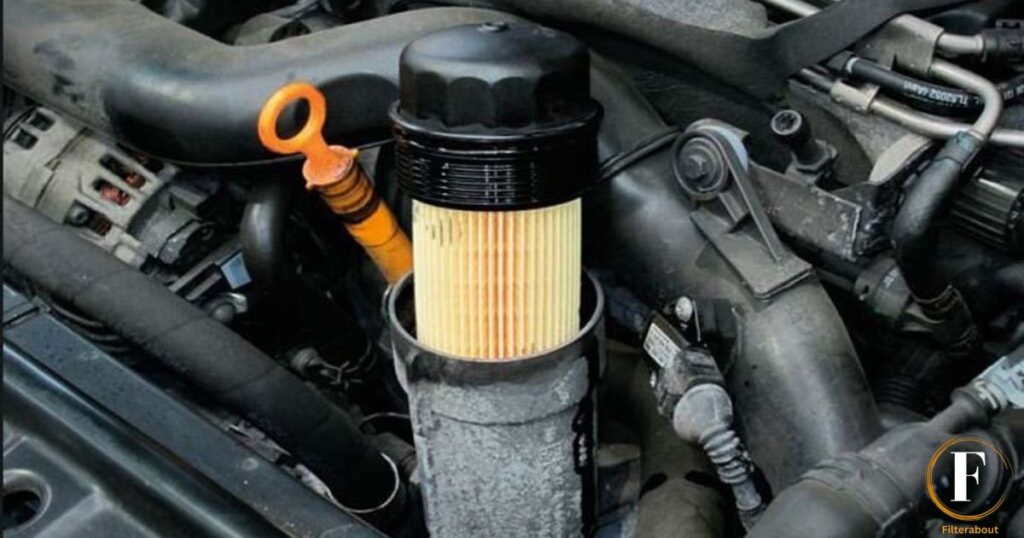Changing the oil filter is a simple automotive maintenance task. It involves removing the old oil filter and replacing it with a new one to ensure clean oil circulation in the engine promoting optimal performance and longevity.
Regular oil filter changes keep your engine healthy. A clean filter ensures optimal performance. How Often Should I Change My Oil Filter? Experts recommend changing it every 3,000 to 5,000 miles. Neglecting this can lead to engine damage. Learn why maintaining your filter matters.
Regularly changing your filter is crucial for keeping your engine in good shape. Doing so ensures optimal engine performance and prevents the buildup of contaminants in the oil which can lead to engine damage over time.
Frequency of Oil Filter Changes
Regular oil filter changes are crucial for maintaining the health and longevity of a vehicle’s engine. The oil filter plays a vital role in removing contaminants and impurities from the engine oil, preventing it from circulating and causing damage.
Over time as the filter accumulates dirt and debris, its effectiveness diminishes. Therefore it is recommended to perform a filter change regularly as part of routine vehicle maintenance.
The frequency of oil filter changes depends on various factors such as the type of oil used driving conditions, and the manufacturer’s recommendations. In general, experts often advise changing the filter every 3,000 to 5,000 miles, although some modern engines and synthetic oils may allow for longer intervals.
Adhering to a consistent schedule of oil filter changes helps ensure optimal engine performance and contributes to the overall health of the vehicle. Don’t overlook the importance of a filter change to maintain a clean and well-lubricated engine, promoting longevity and efficiency in your vehicle’s operation.
Synchronizing with Oil Changes

Oil changes are essential for maintaining the health and longevity of your vehicle’s engine. Regular oil changes help to keep the engine lubricated reduce friction, and prevent the build-up of harmful deposits.
Recommended every 3,000 to 5,000 miles these routine maintenance intervals ensure that the engine operates at peak performance improving fuel efficiency and overall reliability. Timely oil changes also play a crucial role in preventing excessive wear and tear on engine components, contributing to a smoother and more efficient driving experience.
Part of the synchronization process involves addressing the filter change during each oil service. The oil filter plays a vital role in trapping contaminants and impurities preventing them from circulating through the engine. Over time, however, the filter becomes clogged and less effective.
Therefore it’s crucial to replace the oil filter regularly to maintain optimal filtration and ensure the clean flow of oil throughout the engine. By synchronizing oil changes with the necessary filter change, car owners can promote the health and efficiency of their vehicles, extending the engine’s lifespan and minimizing the risk of costly repairs.
Signs from the Service Engine Light
| Step | Action |
| 1 | Observe the Service Engine Light illuminate on your dashboard. |
| 2 | Use an OBD-II scanner to retrieve the trouble codes associated with the light. |
| 3 | Refer to the vehicle’s owner’s manual to interpret the specific trouble codes. |
| 4 | Assess the severity of the issue some codes may indicate minor issues, while others may require immediate attention. |
| 5 | Consult with a qualified mechanic to diagnose and address the underlying problem. |
| 6 | Once the issue is resolved, clear the trouble codes using the OBD-II scanner to turn off the Service Engine Light. |
Effects of Harsh Driving

Harsh driving can have detrimental effects on both your vehicle’s performance and overall longevity. Rapid acceleration abrupt braking and aggressive turns can lead to increased wear and tear on essential components such as the brakes tires, and suspension system.
Harsh driving puts excessive strain on the engine and transmission potentially leading to overheating and reduced fuel efficiency. Consistent harsh driving habits may contribute to a shorter lifespan for various vehicle parts, ultimately requiring more frequent maintenance and repairs.
One crucial aspect affected by harsh driving is the engine’s oil filter. The continuous stress placed on the engine accelerates the accumulation of contaminants in the oil compromising the filter’s effectiveness over time. To mitigate the impact of harsh driving on the engine regular oil filter changes are essential.
Routine maintenance including timely filter changes helps ensure proper lubrication of the engine components enhances overall performance and extends the lifespan of the vehicle. By incorporating regular oil filter changes into your maintenance routine you can counteract the adverse effects of harsh driving and promote the longevity and efficiency of your vehicle.
Specialized Oil Filter Services
- Inspection: The first step in specialized oil filter services involves a comprehensive inspection of the existing oil filter. Technicians assess its condition by looking for signs of wear damage, or clogging.
- Removal: Once the inspection is complete, the old or compromised filter is carefully removed from the engine. Proper tools and techniques are employed to minimize the risk of spillage and ensure a clean process.
- Selection of Specialized Filter: Based on the vehicle’s make and model, technicians choose a specialized oil filter that meets the manufacturer’s specifications. These filters are designed to effectively capture contaminants and promote optimal engine performance.
- Installation: The selected specialized oil filter is securely installed with attention to proper sealing and alignment. Technicians follow manufacturer guidelines to ensure the filter is positioned correctly minimizing the risk of leaks.
- Oil Change: In many cases, specialized filter services are coupled with an oil change. Fresh high-quality oil is added to the engine, enhancing lubrication and overall engine health.
- Testing and Quality Check: To ensure the effectiveness of the new oil filter technicians run the engine and conduct a final check for any leaks or abnormalities. This thorough testing process ensures that the specialized filter is functioning as intended, providing optimal protection for the engine.
Duration of Oil Filter Lifespan

The duration of an oil filter’s lifespan is influenced by various factors including the type of filter driving conditions, and the quality of the oil being used. Most conventional oil filters are designed to last between 3,000 to 5,000 miles or about three to six months under normal driving conditions. However, some high-quality synthetic oil filters may have a longer lifespan lasting up to 10,000 miles or even more.
Regular maintenance including timely oil changes is crucial for the optimal performance of a vehicle. Performing an oil filter change during each oil change is a recommended practice to ensure the efficient removal of contaminants from the engine oil.
Neglecting to change the oil filter can lead to reduced filtration effectiveness potentially allowing harmful particles to circulate in the engine which may contribute to increased wear and tear over time. Therefore to maintain the longevity and health of a vehicle’s engine it is essential to adhere to a routine oil change schedule, which includes the timely replacement of the oil filter.
Quality of Oil Filters
Quality oil filters are essential for maintaining a vehicle’s engine health. They work by removing contaminants like dirt and metal particles from the engine oil preventing damage to engine components.
Regular filter changes done during routine oil changes ensure optimal filtration efficiency and promote smoother engine operation.
An oil filter change is a crucial aspect of vehicle maintenance. It involves replacing the filter at recommended intervals, as specified by the manufacturer.
This timely replacement is vital to prevent the accumulation of contaminants and potential engine damage contributing to overall vehicle performance and longevity.
DIY Oil Filter Replacement

DIY oil filter replacement is a quick and easy way to keep your car’s engine in good shape. To start gather tools like a wrench and filter wrench.
Locate the old filter near the engine use the wrench to remove it and lubricate the new filter’s gasket with oil before installing. Tighten it securely then drain and refill the oil. This simple filter change ensures proper lubrication and extends your engine’s life.
Regular oil filter changes are vital for engine health, removing impurities and promoting efficient operation. DIY oil filter replacement is cost-effective and straightforward requiring basic tools. By performing this maintenance at recommended intervals, you contribute to a smoother-running and longer-lasting
Frequently Asked Questions
How long will an oil filter last?
Oil filters generally last 3,000 to 5,000 miles, depending on driving conditions. Regularly changing those helps maintain engine health and performance.
Is it OK to change the oil but not the filter?
Changing only the oil without replacing the filter compromises engine health. Regularly change both to ensure optimal performance and longevity.
How do I know when my oil filter needs replacing?
Replace the oil filter if you notice decreased fuel efficiency, dirty or dark oil, engine noise, or the manufacturer’s recommended service interval.
Can an oil filter last 2 oil changes?
While some high-quality filters may last through two oil changes, it’s generally recommended to replace both oil and filter together for optimal engine performance.
Conclusion
The optimal frequency for changing your oil filter is crucial for maintaining the health and longevity of your vehicle. Regular filter replacements play a pivotal role in ensuring that your engine operates smoothly by trapping contaminants and preventing them from circulating within the system. While the standard recommendation is to change the oil filter every 3,000 to 5,000 miles, it’s essential to consider factors such as driving conditions vehicle type and the type of oil used.
Adhering to a consistent maintenance schedule not only enhances engine performance but also contributes to fuel efficiency and overall reliability. By asking the question How Often Should I Change My Oil Filter? and staying informed about your vehicle’s specific needs, you can make informed decisions that will ultimately save you money and extend the life of your engine. Regular filter changes are a small investment with significant long-term benefits, ensuring your vehicle continues to run smoothly mile after mile.

Alexander Quinn is the author behind Filterabout.com. Known for expertise in diverse topics, Quinn’s content on the website reflects a versatile knowledge base catering to various interests.



![Jynxzi Age, Net Worth, Career[2024]](https://filterabout.com/wp-content/uploads/2024/05/Who-Is-Shanin-Blake-Age-Wiki-Parents-Dating-Net-Worth-300x148.jpg)
![Jynxzi Age, Net Worth, Career[2024]](https://filterabout.com/wp-content/uploads/2024/05/Jynxzi-Age-Net-Worth-Career2024-300x148.jpg)


![Kutty Surumi Net Worth, Bio, Age[2024]](https://filterabout.com/wp-content/uploads/2024/05/Kutty-Surumi-Net-Worth-Bio-Age2024-300x148.jpg)



![Jynxzi Age, Net Worth, Career[2024]](https://filterabout.com/wp-content/uploads/2024/05/Who-Is-Shanin-Blake-Age-Wiki-Parents-Dating-Net-Worth-150x150.jpg)